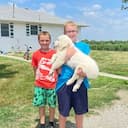Origins and Temperament
Boasting a lineage dating back to the late 19th century, the Doberman Pinscher is a breed engineered for stamina, intelligence, and strength. Originally bred by the German tax collector Louis Dobermann for protection on his rounds, these dogs are known for their loyalty and courage. Intensely protective yet affectionate with their owners, the Doberman's alert demeanor means they can sometimes be wary of strangers. When it comes to travel, this breed's innate vigilance and strong attachment to their human companions necessitate a transport environment that feels secure and reassuring to mitigate any stress.
Size and Physical Needs
Typically weighing between 60 to 100 pounds, Dobermans are powerful and energetic dogs that demand ample space to ensure comfort during transportation. Given their high energy levels, ensuring that they've had adequate exercise before embarking on their journey is vital. Special accommodations might include ample room to stand and stretch, a non-slip surface for stability, and moderate temperatures, as they have short coats and can be sensitive to cold.
Common Health Considerations
Known health issues for Dobermans include cardiac conditions, Wobbler syndrome, and hip dysplasia. It's crucial for transportation services to be informed of these potential challenges, with all health documentation readily available. Before travel, owners should verify vaccinations, administer any regular medications, and take preventative measures to ensure the Doberman's health remains intact throughout the journey.
















